Basketball drills
Start with 1 ball, later on you can use two balls.
- 4 rows in 4 corners
- 1 ball in opposite corner
- pass to the man on the right, run straight ahead
- pass to the running man, and run straight ahead
- running man passes straight ahead, connecting behind the second row.
- Call out the name of the person you're passing to.
- after 5 minutes, switch sides and pass left
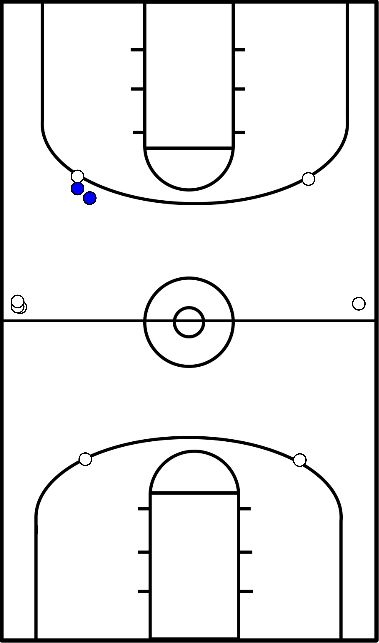
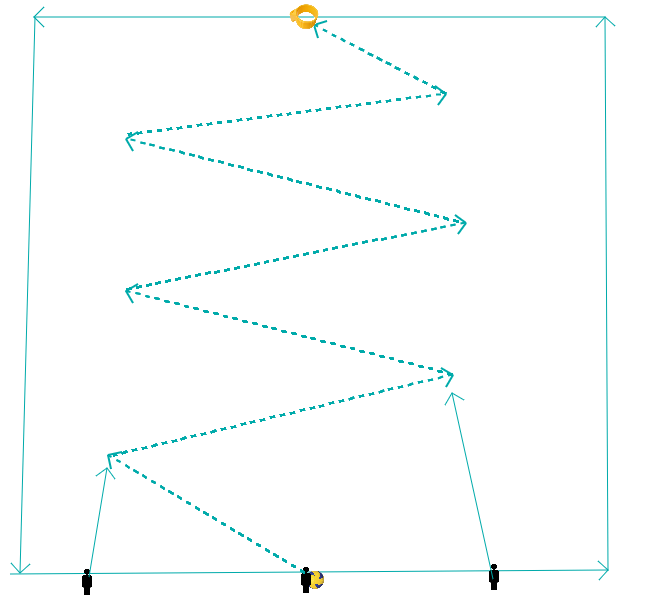
- With 3 men on the back line and the middle one has a ball.
- The middle one passes to a man and chases the ball.
- The receiver keeps the ball behind him and the one who passed first takes the ball and passes on.
- The person who has the ball behind his back runs behind the ball, picks it up at the receiver and passes on to the other side.
- They do this while running to the basket on the other side.
- If someone is close enough to the basket, the man plays a lay-up.
- Make variations on the passing lines
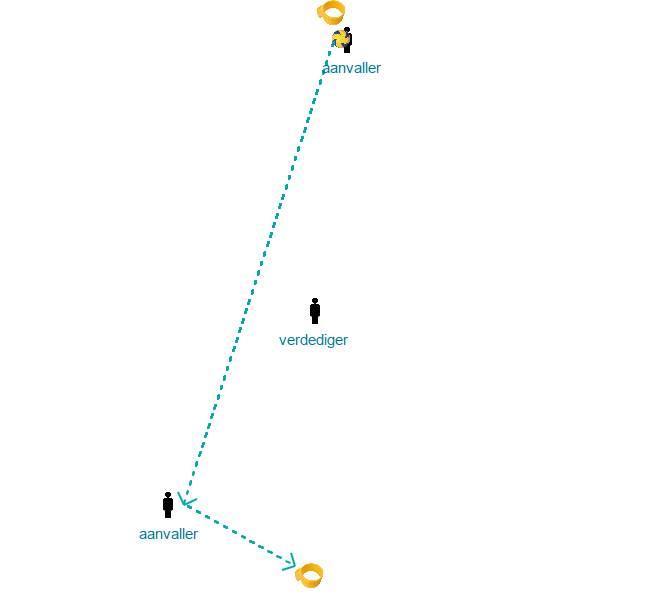
- Consider the pilons as the defense (players can also be used for this).
- Player 1 (white runs) towards player blue.
- Halfway through the run, player blue runs behind his defender and asks for the ball.
- Player white passes to blue.
- As soon as player blue catches the ball, player red sprints away behind his defender.
- As soon as player red catches the ball player 2 sprints away from white behind his defender.
- The makes the circle go round. This is an active exercise in which timing, passing and catching are a crucial part.
- Because everyone is busy, this is also conditionally a good drill.
- With younger players the distance between pilons is shorter.
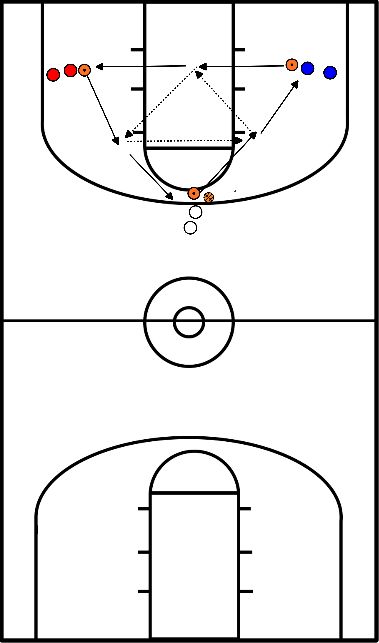
To improve shooting, the players practice the movement first without the actual basket.
- They stand in position with knees slightly bent,
- hold a basketball with the strong hand under the ball and the other hand behind it.
- The players bring the ball to the shot zone (in front of and above the head).
- Next, the players push the basketball in the desired direction after which the hand and wrist move downwards (gooseneck).
- If this goes well, the players can try to shoot in the direction of the basket.
- They can vary with place and distance.
The players practice the lay-up.
- They divide themselves over 2 rows, 1 on the left side of the basket and 1 on the right side of the basket.
- The first player of each row dribbles to the basket with the strong hand.
- Then the player takes 2 steps, first with the strong leg, then with the weaker leg.
- The player takes a jump with the strong leg and tries to throw the ball against the square on the board after which it ends up in the basket.
- The player catches the ball and dribbles to the row on the other side and then ends at the back of the row to try it from the other side.
- Centers
- Starting from U16
- 2 or 4 centers
- 1 ball per pair
- a basket
Aim:
- Defending a turn around jump shot
- box out after shot
- stimulate offensive rebound after shot
Organization:
- attacker turns around his axis and shoots
- Defender brings his body in front of the ball with a slide-step, as close as possible to the body of the attacker.
- keeps both arms straight up (= wall) so that the attacker has less view of the basket and has to adjust his shot slightly to shoot over the outstretched arms
- box out immediately after the shot
- A goal is 1 point
- offensive rebound is 2 points even after a goal
- each player defends 5 times in a row
- loser for each point difference: 2 push-ups
Teaching points:
- feet slightly wider than shoulder width
- knees slightly bent
- upper body and arms vertically
- NO batting movement towards the ball
- stand up against the attacker by moving towards the attacker (the upper body remains vertical)
Variant:
- attacker starts under the ring, with his back to the back line and gives a short bounce pass to himself
- attacker first makes a shoulder fake in the opposite direction just before the shot
Aim:
- Elbow shot
- Outlet pass after scoring
- overhead pass from low post to elbow
Organization:
- rebounding after shot and stepping directly over the back line and taking the ball
- always follow the ball and take the next position
- set a target; e.g. 30 shots
Teaching Points:
- In the final step, bring the ball over the head and turn the face towards the field
- tight overhead pass to the outlet
- ask high for the ball
- Pass the ball in the shooting hand
Variations:
- left and right
- Fill waiting time at forward position with fake passes
- Vice versa: After scoring, pass to the elbow and shoot from the corner
1. The players dribble to the pole and pass it with a cross over.
2. Then the player dribbles towards the bucket.
3. The player finishes with a Euro step, passing the pilons.
4. Possibly a defender can run in from the baseline, the attacker has to pass the defender.
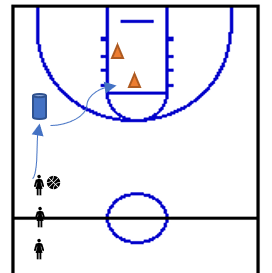
1. The players dribble to the pole and pass it with a cross over.
2. Then the player dribbles towards the bucket and finishes with a floater.
3. Pay attention to the balance and the footwork.
4. The coach takes place in the middle of the bucket with the hands up.
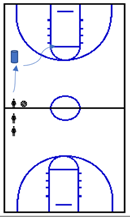
- Centers + Guards + Forwards - starting from U12
- 2 or more players
- 1 ball per pair
- two baskets
Requirements:
- Performing a layup while running and receiving a pass
Aim:
- Speed dribble along the sideline because it is the shortest route to the other side
- pass and catch at speed
Organization:
- player shoots a free throw and takes the rebound
- catch the ball as high as possible
- 3 sprints to the outlet position and calls
- passes with an overhead pass to the outlet
- the man with the ball dribbles along the sideline as fast as possible
- the man with the ball passes to the one who shot
- gets the pass at full speed
- and makes the layup without a dribble
Teaching Points:
- Sprinting
- communication
- correct dribble start
- pushing the ball at speed dribble
- dribbler should see where the flyer is
- pass timing
- shooter catches his own ball
- Player that passes the ball sprints under the circle to the outlet on the other side
- calls
- gets the ball at the outlet position with an overhead pass
- Both players walk the same 2 to 0 break as on the way there
- but now on the other half of the field
Variation:
- Put 1 defender at each basket
- Defender catches the ball and gives outlet pass
- and becomes a flyer
- shooter becomes defender
- rebounder (1) passes to outlet (2)
- and runs behind the outlet along the sideline to the other side to get the ball back for a layup.
- Outlet (2) passes to a man in center circle (3),
- He then dribbles to approx. the 3-point line and plays a bounce pass to (1) for lay-up.
- (3) takes the rebound and is becomes (1) at the opposite site of the field
- With 10 persons or more, include one (4) in the far corner.
- In that case, (3) passes to (4), which then gives a bounce pass to (1)
- and then grabs the rebound and becomes (1).
This exercise helps players with their conditioning and their ability to shoot a ball while running as well as when they are tired.
1. break up your team into three groups of four players each. One group is located on each baseline and one group is in the middle of the court, as shown in the picture.
2. The four players on the center line must spread out along the center line.
3. the groups of four players standing on the baselines each get a basketball.
4. When the whistle sounds, the players in the middle run to the baseline and ask for a ball that is passed to them by a player on the baseline.
5. The player then catches the ball, shoots at the nearest basket and retrieves his own rebound.
6. The person who has passed the ball runs to the other end of the court and gets a pass from the other baseline and the rotation continues.
Learning points
- players should be reminded to work hard in this exercise for conditioning purposes.
- They should also give a target for passing the ball and use appropriate footwork and shooting techniques.
- Make sure that the passes are clean and good
Variations
- The type of scoring can be varied in this exercise (3-point, mid-range, lay-ups, etc.)
- Give the players a certain time and a goal for the number of points to be made.
- This can be varied depending on the ability of the team or the time you have available.
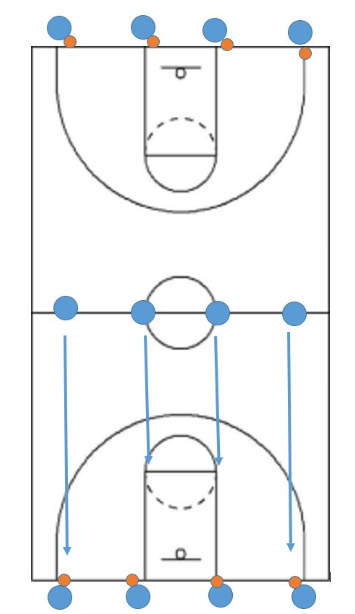
Lay-up exercise across the width of the room:
After you've made the lay-up, catch the ball and play it through with a bounce pass to a player without the ball in the row you came from!









